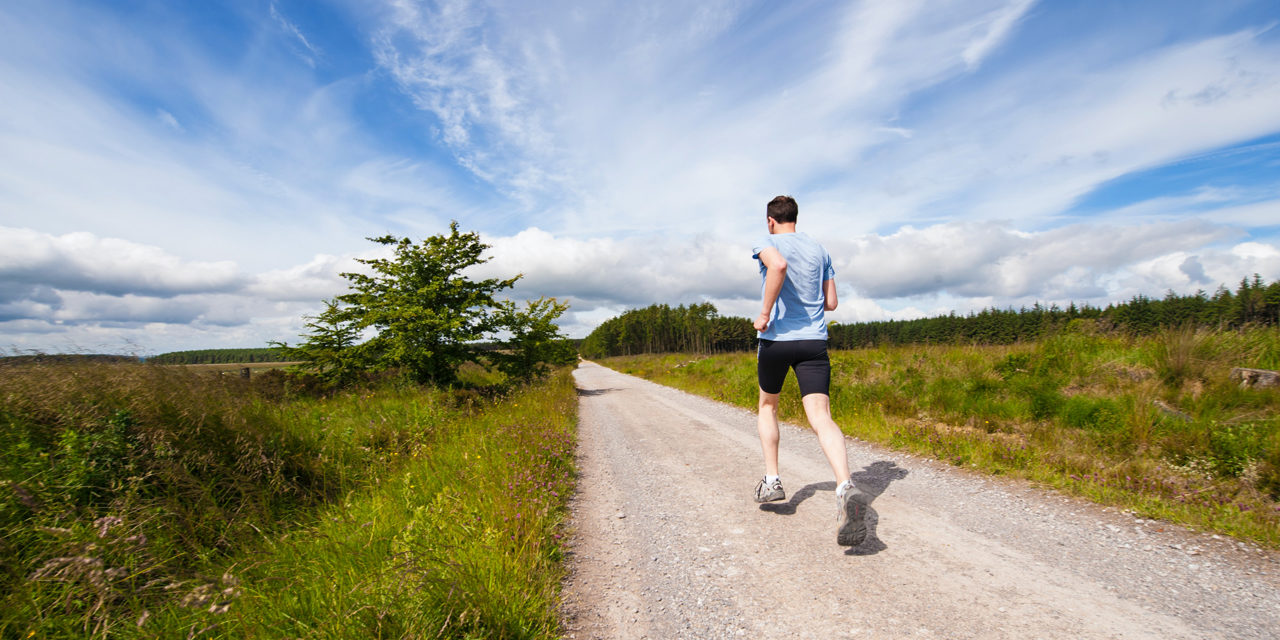Across America, millions of people have been forced into new routines. Most significantly, people are homebound – ordered in many states to only go out for essentials.
Gyms and workout facilities – closed. Playgrounds – closed. Parks – closed. Recreational facilities – closed. Places people have come to depend on for their fitness activities are no longer options. They have been temporarily and, in some cases, permanently taken away. It was recently announced that all three Gold’s Gym locations in Colorado Springs will not be reopening.
Whether or not you’re a frequent user of facilities that are now closed, hopefully you’re capitalizing on one opportunity the shutdown has provided. Namely, to improve your health and fitness.
When it comes to fitness, the number one reason people give for not exercising is time – they don’t have enough of it. The second reason people state is change: change in work schedule, change in weather, change in family situation, change in school schedule, change in health, etc. In other words, their routine has been interrupted or altered.
For years, epidemiological studies have highlighted the role that exercise and being fit plays in disease prevention and health promotion. Simply stated, most people are aware that exercise is good for them and should be part of their regular routine.
As it relates to COVID-19, Richard J. Simpson, Ph.D., associate professor in the Departments of Nutritional Sciences, Pediatrics and Immunobiology at the University of Arizona, indicated that, “It is likely that keeping active will boost our immune system to help minimize the deleterious effects of the virus, ameliorate our symptoms, expedite our recovery times and lower the likelihood that we can infect others with whom we come into contact.”
Evidence is surfacing that many of those who have unfortunately died with COVID-19 also had one or more disease conditions including high blood pressure, obesity, and type 2 diabetes. It’s well known that those conditions are related and all highly associated to lifestyle choices and are preventable. As reported by Harvard School of Public Health, about 9 in 10 cases of type 2 diabetes in the U.S. can be avoided by making lifestyle changes, including exercise.
According to the CDC, 34.2 million Americans—just over 1 in 10—have diabetes and 88 million American adults—approximately 1 in 3—have prediabetes.
But we also realize that knowing doesn’t always result in doing. Simply being aware of something, even if it’s beneficial, isn’t enough to cause sustainable change. As a result, people who do not get sufficient exercise and the associated benefits, thus suffer self-imposed health consequences.
How can you take advantage of this historic time to enhance your health and fitness? A time like no other, and an opportunity you may never have again.
Options
As with almost everything, it begins with mindset. So, what are your options?
In Carol Dweck’s insightful book, Mindset, she presents two opposing mindsets: the fixed mindset and the growth mindset. In a fixed mindset, people believe their qualities are fixed traits and therefore cannot change. They typically avoid challenges, give up easily, see effort as fruitless, ignore useful negative feedback, feel threatened by the success of others and as a result achieve less than their full potential.
People with a growth mindset feel their skills and intelligence can be improved with effort and persistence. They embrace challenges, persist in the face of setbacks, see effort as the path to mastery, learn from criticism, are inspired by others’ success, and as a result achieve ever high levels of achievement.
Awareness is a critical component in behavior change. Honestly evaluating your mindset and self-talk will help you uncover what may be holding you back in your quest to get in shape and improve your health.
In my experience, harder than the physical work required to improve your health is the metal work needed to get your mind thinking in the right direction. This is especially true if you’ve previously started exercising, but soon quit.
In that case, you’ve probably established false beliefs about your ability to succeed. Since you’ve “failed” in the past, your confidence may be lacking. You may be asking, “Why should I even start, I know I’ll fail, just like before.” Instead of viewing past attempts as failures, ask yourself what you learned that you can now apply to be successful.
Practice questioning negative thoughts that lead you to feel or respond in a way that is counterproductive. Ask yourself: Is this thought helping me or hurting me? Is it in my best interest? Is it moving me closer or further away from my goals and what I value? Is it leading me toward positive action or causing fear and self-doubt?
Correcting and reversing a negative or fixed mindset requires diligent, intentional focus. Even positive people continually practice maintaining their growth mindset. And when the inevitable dip in attitude comes, they too must recognize and self-correct.
Opportunities
In addition to your mindset options, consider what opportunities the shutdown has provided that can assist in your quest to become fitter and healthier.
As noted, not having enough time is the most often stated reason for not exercising consistently. As a side thought, I’ve always questioned that logic, since it implies that those who do exercise somehow magically have more time available. Is that really true?
Nonetheless, the shutdown has opened opportunities, if you’re willing to capitalize on them. For the time being, there are no kid’s activities to attend, no practices, no taking to or picking kids up from school, no lunches to make, no lessons to get to, no birthday parties, no going to the movie theatre, no church activities to attend, no current sporting events on TV to watch, etc. Certainly, those all required a time commitment.
If you’re working from home, no longer do you need to commute (no drive-time). You have no water-cooler time, less time required to get ready, and your bathroom is probably a lot closer! If you’ve unfortunately lost your job, you have suddenly more time available than you’d like. What better investment than to use this time to focus on you?
You’ll find a list of exercise options HERE that you can download which provides activities in which you can engage. The list includes indoor and outdoor options, fitness and rec activities, free and fee-based options, and workspace ideas.
Regular exercise is probably the number one thing you can do to improve your level of health. But how much should you do? General guidelines are to engage in cardiovascular-type exercise three or more times per week – shoot for 30 or more minutes of continuous exercise; do some form of strength and core work a minimum of two times per week; include flexibility and balance exercises, especially as you get older. If engaged in properly, traditional recreational activities, like golf, tennis, and pickleball, can also be health promoting
For something to become a habit, you need to do it more often than you don’t do it. Therefore, committing to exercise four or more time per week will put you on the road to being consistent.
The key to exercise is consistency. Consistency follows commitment. Commitment comes from your values. Do you value your health? In every case, your actions reveal what you truly value. By using this time to become more active, you’re not only saying you value your health, you’re demonstrating it as well.
Always consult with your physician, if you question the prudence of becoming more active. For most people, the health risks of staying inactive are greater than if they were to start moving more.
Optimism
Lastly, maintain your optimism! What we’re going through is just that . . . something we’re going through. We will come out and prevail on the other side. Believe it! The question is, will you come out in better or worse shape mentally, relationally, spiritually and physically?
Being optimistic requires adopting a long-term vision. At the same time, optimism doesn’t deny the reality of your current situation. Instead, you must acknowledge and allow yourself to accept and adapt to the undeniable losses that you and many others are facing . . . including my family.
One of our sons is a high school senior and an outstanding track athlete. Now he’s having to face losing his senior track season and, most likely, no senior graduation ceremony. So, he’s adjusted his initial, natural disappointment and loss to focusing on preparing for cross-country season at the college he’ll be attending this fall. That’s now what gets him out the door to train every day.
Our daughter, who’s a junior at the US Air Force Academy, had qualified to run the 5K at the NCAA Indoor National Track Meet in March. The day before the event, the NCAA cancelled her race, and all other NCAA activities for the spring season.
On the disheartened ride from Albuquerque back to the Academy, she penned this on Instagram: “Today the NCAA cancelled all winter championships and suspended spring sports for the time being. As I have been preparing to race in the 5K at Nationals, I am extremely disappointed. However, it’s important to realize that life is so much more than a single race. I will continue to be thankful for every racing opportunity I get. And while I am sad, I will praise Jesus in every circumstance and have faith. Because his ways will forever be higher and greater than mine. And I believe that with all my heart. So, the training will continue, because you never know when the next opportunity will come by. And I will be ready for it.”
You too have the option of using this time and opportunity to prepare for life after the shutdown by establishing healthy habits that will stick. So, will you choose to bide your time and just wait until things return to normal? Or will you utilize this time to train and prepare for life to be better for you in all areas, especially your health and fitness.
We will get through this. And when we do, will you be ready for it?
Miles Mettler works for the Office of the President at Focus on the Family. He earned a doctorate in Exercise and Wellness from Arizona State University. You can contact the author at milesmettler.com






